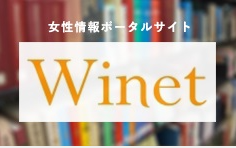International Cooperation
- HOME
- International Cooperation
- NWEC Global Seminar
- FY2016 NWEC Global Seminar: Promotion for Advancement of Women –Lessons from Europe
NWEC Global Seminar
- Event Report
-
FY2016 NWEC Global Seminar: Promotion for Advancement of Women –Lessons from Europe
Date:December 2, 2016
Place:Shufu Kaikan Plaza F B2F Clarte Conference Room /
National Women’s Education Center of Japan (NWEC) invites overseas specialists and analyzes issues pertinent to the Asian Pacific Region around themes of a global scale such as women’s human rights and women’s capacity building and training; enhance exchange with researchers, government officials and leaders of women's organizations; and build networks.
On Friday, December 2, 2016, the National Women’s Education Center of Japan hosted the 2016 NWEC Global Seminar under the theme of “Initiatives for Promoting Women’s Empowerment - Learning from Europe’s Experience” at Shufu Kaikan Plaza F (Chiyoda-ku, Tokyo), where active discussions among nearly 90 domestic and international participants took place.
The keynote speaker for Part I was Ms. Kira Appel, Chief Adviser to the Minister of the Ministry for Children, Education, and Gender Equality, Kingdom of Denmark. In a presentation titled “Gender Equality in Denmark - a Long but Rewarding Journey,” she provided a detailed report on the historical, legal and institutional initiatives in Denmark and described the political drivers and societal development necessary for ensuring equal opportunities in Denmark.
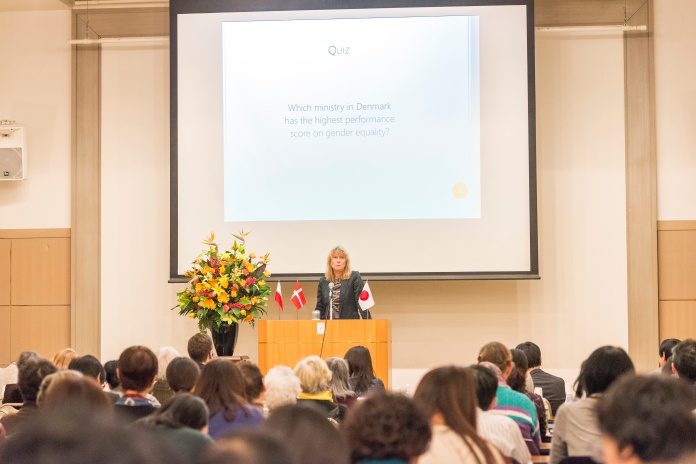 Part I Keynote Address
Part I Keynote Address
Based on her experience in engaging in drawing up and formulating the government’s action plans/gender equality policies, Ms. Appel described that behind the status quo, there have been historical initiatives, and the institutional framework to promote gender equality has functioned strongly. She also concluded that as prerequisites for future progress, candid discussions on the following subjects are essential: ① the institution for gender equality promotion/social welfare organizations stipulated in the law; ② economic/personal independence; ③ benefits of diversity and gender equality.
Ms. Appel also emphasized that the current gender equality in Denmark was achieved as a result of a long history. As a starting point, women’s suffrage was granted in 1915, and the first female minister was inaugurated in 1924. The participation of women in the labor market was encouraged in the 1960s, and institutions were put in place in the 1970s. Thus, the women’s movement and the fight to win rights in which small achievements were accumulated brought a change to society and realized today’s current gender equality. Her explanation that equality is a consequence of proactive initiatives that became possible gradually through a difficult journey – rather than being naturally generated – provided the participants with a strong message and a deep and profound impression.
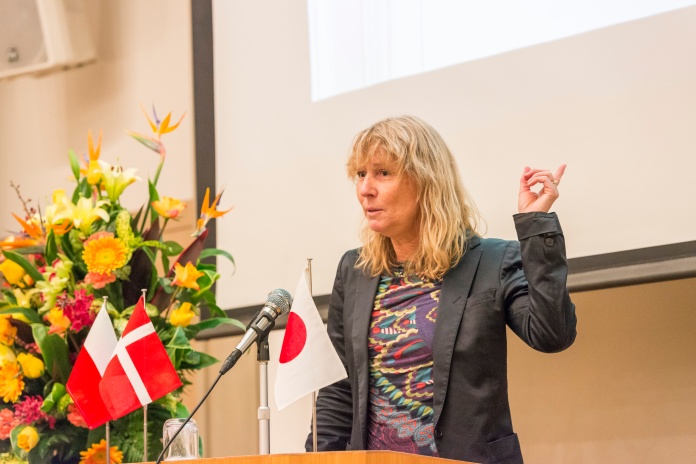 Ms. Kira Appel
Ms. Kira Appel
In the panel discussion for Part II, there were enthusiastic reports and discussions under the main theme of “Initiatives for Promoting Women’s Empowerment - Challenges for the EU and Japan.” The forward-thinking initiatives taken by EU countries to lead gender equality are highly suggestive to Japanese society, and on-going initiatives in Denmark, Poland, and Japan were discussed and shared by the panelists.
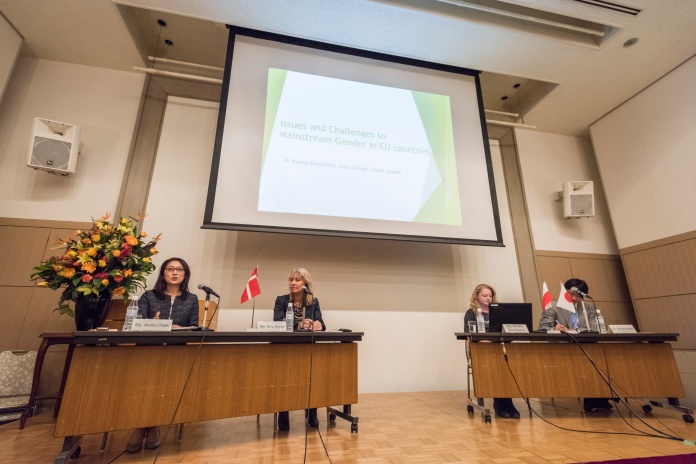 Part II Panel Discussion
Part II Panel Discussion
Based on her experience in working on gender equality for ten years in the Polish government, Ms. Monika Ksieniewicz explained about “Issues and Challenges to Mainstream Gender in EU countries.” The sequence of events leading up to mainstream gender through the Treaty of Rome, the Amsterdam Treaty, the Lisbon Treaty, etc., as well as examples in Poland were introduced, and the European Union’s project toward gender equality was outlined in detail.
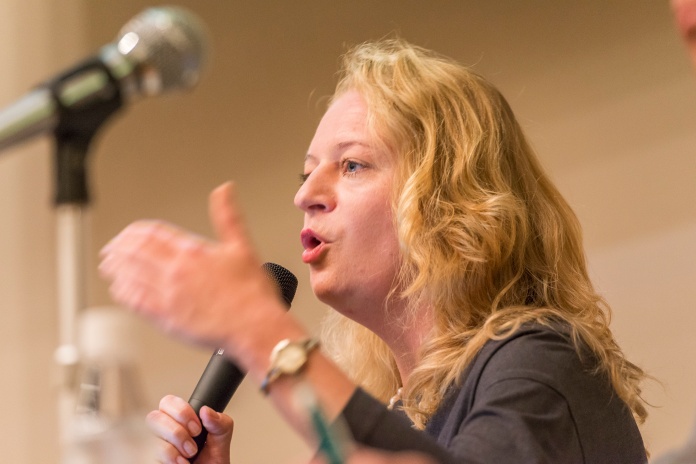 Ms. Monika Ksieniewicz
Ms. Monika Ksieniewicz
As an expert of work life balance policies, in particular men’s way of working, child rearing, and working environment, Mr. Shingou Ikeda clarified the current situation in Japan by referring to the survey results under the theme of “Challenges of Women’s Work in Japan - Toward Reform of Men’s Way of Working.” He highlighted the fact that Japanese legal policies related to men’s and women’s ways of working still tolerate long working hours, although they have aimed at a good balance between work and family since the 1980s. Mr. Ikeda explained problems facing female part-timers and the increase in the number of persons who leave their jobs for nursing care. Toward the reform of men’s and women’s ways of working, he put forward the following suggestions: ① job opportunities opened to all women; ② Men’s way of working: restructuring of attractive career models. His concluding remarks were “men for family, and women for work.”
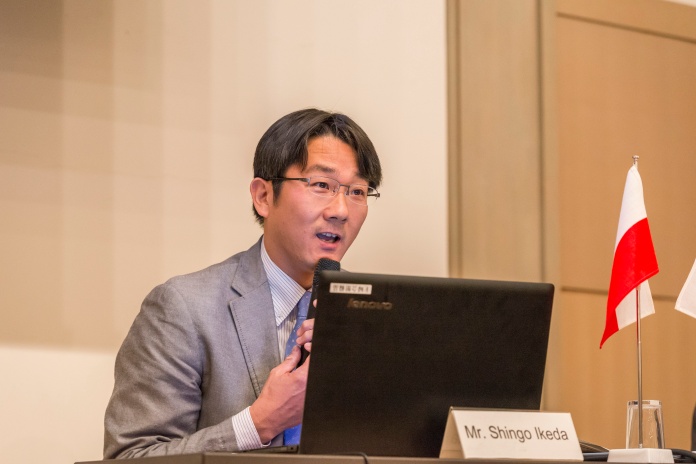 Mr. Shingo Ikeda
Mr. Shingo Ikeda
Based on her diverse experience in joining the United Nations Development Program to promote gender equality and women’s empowerment in developing countries, Ms. Asako Osaki facilitated and guided the complicated themes addressing what is needed for the advancement of women so that discussions could be further deepened. The keynote speaker, Ms. Appel, also joined in the discussions, and heated talks continued.
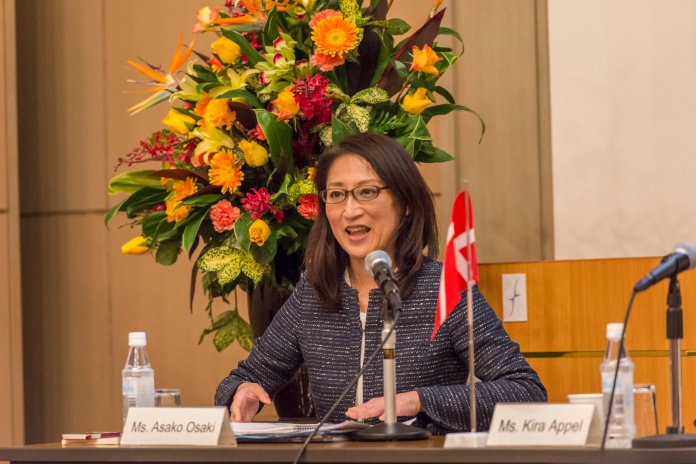 Ms. Asako Osaki
Ms. Asako Osaki
In the question and answer session, a number of questions came from the participants, and active discussions were conducted. Ms. Appel was asked about the current status associated with childcare in Denmark, where more than 97 percent of children attend nursery school, the male to female ratio/wages of nursery school teachers, actual support for single mothers. When answering some questions, she stressed that education is the most important factor for gender equality and provided young women with appropriate advice that women should develop their careers and become economically independent.
Mr. Ikeda was asked a fundamental question about what is necessary for men to change their way of working and answered that it is necessary to increase the number of regular employees and make tireless efforts to make workplaces/companies more comfortable places to work for everyone.
Through the lectures and discussions, this was a fruitful seminar which could implicitly show us the future direction of Japan.
International Cooperation
- International Seminar
- FY2019 Seminar for Gender Equality Officers and Women Leaders in the Asia Region
- FY2018 Seminar for Gender Equality Officers and Women Leaders in the Asia Region
- FY2017 Seminar for Gender Equality Officers and Women Leaders in the Asia Region
- FY2016 Seminar for Gender Equality Officers and Women Leaders in the Asia Region
- FY2015 Seminar for Gender Equality Officers and Women Leaders in the Asia Pacific Region
- FY2014 Seminar for Gender Equality Officers and Women Leaders in the Asia Pacific Region
- FY2013 Seminar for Gender Equality Officers and Women Leaders in the Asia Pacific Region
- FY2012 Seminar for Gender Equality Officers and Women Leaders in the Asia Pacific Region
- FY2011 Seminar for Gender Equality Officer and Women Leaders in the Asia Pacific Region
- FY2010 Empowerment Seminar for Women Leaders in the Asia Pacific Region
- FY2009 Empowerment Seminar for Women Leaders in the Asia Pacific Region Final Report
- FY2008 Empowerment Seminar for Women Leaders in the Asia Pacific Region
- FY2007 Empowerment Seminar for Women Leaders in the Asia Pacific Region
- FY2006 Empowerment Seminar for Women Leaders in the Asia Pacific Region
- NWEC Global Seminar
- FY2025 NWEC Global Seminar: Addressing Technology-Facilitated Gender Based Violence (TFGBV): Approaches to Eradicate the Invisible Harm
- FY2024 NWEC Global Seminar: Gender Equality and Care
- FY2023 NWEC Global Seminar: Gender Mainstreaming & Strengthening Institutional Mechanism with Gender Perspective
- FY2022 NWEC Global Seminar: Does Digital Technology Advance Gender Equality?
- FY2021 NWEC Global Seminar: Combating Gender-Based Violence – “Building Back Better” from the Covid-19 Crisis
- FY2020 NWEC Global Seminar: Covid-19 and Gender
- FY2019 NWEC Global Seminar: Gender and Media
- FY2018 NWEC Global Seminar: Promotion of the Advancement of Women - What Japan can learn from Iceland about Gender Equality?
- FY2017 NWEC Global Seminar: Promotion for Advancement of Women Lessons from Germany
- FY2016 NWEC Global Seminar: Promotion for Advancement of Women –Lessons from Europe
- FY2015 International Symposium: Gender Equality and Women's Empowerment
- FY2014 International Symposium: Keys to Diversity and Women's Leadership
- FY2013 NWEC International Symposium:Gender Equality for Men
- FY2012 NWEC International Symposium:To Make a Society without Violence against Women a Reality
- FY2011 NWEC International Symposium
- FY2010 International Forum for Women's Empowerment
- FY2009 International Forum for Women's Empowerment
- FY2008 International Forum for Women's Empowerment Final Report3
- FY2008 International Forum for Women's Empowerment Final Report2
- FY2008 International Forum for Women's Empowerment Final Report1
- Cooperation with JICA
- FY2025 Knowledge Co-Creation Program (KCCP): "Promotion of Global Networking on Anti-Trafficking in Persons"
- FY2025 Knowledge Co-Creation Program "Eradicating Sexual and Gender-Based Violence (SGBV)"
- FY2025 Knowledge Co-Creation Program: Bangladesh “Strengthening Capacity to Address Gender-Based Violence"
- FY2024 Knowledge Co-Creation Program on "Promotion of Global Networking on Anti-Trafficking in Persons"
- FY2024 Knowledge Co-Creation Program "Eradicating Sexual and Gender-Based Violence (SGBV)"
- FY2023 Knowledge Co-creation Program "Promotion of Networking among ASEAN Countries on Anti-Trafficking in Persons”
- FY2023 Knowledge Co-Creation Program "Eradicating Sexual and Gender-Based Violence (SGBV)"
- FY2022 Knowledge Co-creation Program "Promotion of Networking among ASEAN Countries on Anti-Trafficking in Persons”
- FY2022 Knowledge Co-Creation Program "Eradicating Sexual and Gender-Based Violence (SGBV)"
- FY2021 Knowledge Co-creation Program "Promotion of Networking among ASEAN Countries on Anti-Trafficking in Persons”
- FY2020 Knowledge Co-creation Program "Promotion of Networking among ASEAN Countries on Anti-Trafficking in Persons”
- FY2019 Knowledge Co-creation Program "Promotion of Networking among ASEAN Countries on Anti-Trafficking in Persons”
- FY2018 Knowledge Co-creation Program "Promotion of Networking among ASEAN Countries on Anti-Trafficking in Persons”
- Issue-specific Training “Seminar on Promotiom of Networking among ASEAN Countries on Anti-Trafficking in Persons”
- Basic Information-Gathering Survey/Workshop Seminar on the Economic Independence for Women in Central America and the Caribbean (El Salvador/Dominican Republic)
- Regional Gender Seminar in Central and South America
- 2015 Issue-specific Training "Seminar on Promotion of Networking among Asian Countries on Anti-Trafficking in Persons"
- Seminar on the Promotion of Education for Girls and Women II
- International Conference/International Exchange
- Visit by Professor Hilado from the University of the Philippines Visayas
- Online meeting with Seisen International School elementary students
- Visitor: Mansfield Fellows
- Visitor:JICA Knowledge Co-Creation Program (KCCP) on "Women's Empowerment through Business for Central American Integration System (SICA) Member Countries"
- The 68th Session of the Commission on the Status of Women
- Visitor: Madam Sustjie Mbumba, First Lady of the Republic of Namibia
- Workshop of commemorating the donation of the Beate Shirota Gordon archive materials
- Meeting with Korean Women’s Development Institute (KWDI)
- The Coalition of Finnish Women's Associations (NYTKIS) Secretary General Ms. KAKKOLA’s Courtesy Call to Foreign Minister KAMIKAWA
- The Coalition of Finnish Women's Associations (NYTKIS) Secretary General Ms. KAKKOLA’s Japan Visit Program
- The 67th Session of the Commission on the Status of Women
- NGO CSW67 Forum
- Webinar with Korean Women’s Development Institute (KWDI)
- The 66th Session of the Commission on the Status of Women (Hybrid format)
- Online meeting with international graduate students from the Appropriate Technology course at the University of Tsukuba
- The 65th session of the Commission on the Status of Women
- Lecture "The Beate Sirota Gordon Archives at Mills College"
- Participation in 2nd AGenT
- The 64th session of the Commission on the Status of Women
- Dr. Wang from National Taiwan University visits NWEC
- Japan Network of Women Engineers and Scientists and The Japan Inter-Society Liaison Association Committee for Promoting Equal Participation of Men and Women in Science and Engineering: 9th Japan Korea China Women Leaders Forum for Science & Technology
- Researcher from the KWDI visits NWEC
- Visit by a delegation from the Socialist Republic of Vietnam Ministry of National Defense
- Briefing on the Reykjavik Index for Leadership
- Women's Archives Center Exhibition "Beate Sirota Gordon and gender equality in Japanese Constitution"
- Visit from the Guangxi Women’s Federation
- Participation in the 63rd Session of the Commission on the Status of Women
- 7th Global Forum on Gender Statistics
- FY2018 International Symposium hosted by Korean Institute for Gender Equality Promotion and Education “Gender Equality at Schools”
- Visit from All-China Women’s Federation(ACWF)
- Participation in the 62nd Session of the Commission on the Status of Women
- The 14th KIGEPE International Symposium “Empowering Women’s Leadership: expanding influence and innovation”
- Participation in the 61st Session of the Commission on the Status of Women
- Visit from the Batis Center for Women
- 2011 Asia Women Eco-Science Forum (a forum of science and engineering leaders in Japan, China and Korea)
- The 60th Session of the Commission on the Status of Women
- The 59th Session of the United Nations Commission on the Status of Women
- The 58th Commission on the Status of Women
- The 57th Session of the United Nations Commission on the Status of Women
- International Symposium: Gender Awareness Education for Sustainable Development
- Thirtieth Anniversary Programs
- Attendance at the Ceremony Commemorating the 25th Anniversary of the Korean Women’s Development Institute (KWDI)
- Japanese-Filipino children (JFC)* from the Philippines-based NGO “DAWN” visit the Center
- Visitors from Abroad to NWEC
- Research report on Multicultural Family Support in South Korea
- Workshop on Gender and Education: Life-long Learning for Women’s Empowerment
- Lecture Delivered by a Visiting Researcher
- Connections: Bringing Together the Next Generation of Women Leaders in Science, Technology, Engineering and Mathematics
- Conclusion of Memorandum of Understanding on Exchange and Cooperation with the Ministry of Women's Affairs, Royal Government of Cambodia
- Visit to Japan by the Minister of Women’s Affairs of the Royal Government of Cambodia
- KIGEPE Delegation Visit
- Officials of Ministry of Information and Communications of the Socialist Republic of Vietnam visited NWEC
- The 56th Commission on the Status of Women
- Dr. Barker's visit
- Multidisciplinary Intellectual Exchange for Women Leaders from the United States, Japan, South Korea and the Philippines
- Courtesy visit to University of Hawai`i
- Delegation of Board for the Advancement of Women, Ministry of Finance of the Socialist Republic of Vietnam visited NWEC
- Visit Korean Women's Development Institute (KWDI)
- Report on Participation in the 5th World Social Forum on Migration
- A group led by the Vice President of the Korean Women's Development Institute visited NWEC
- A disaster management specialist from India visits the Center
- Visit to the Korean Institute for Gender Equality Promotion & Education (KIGEPE) and others
- Secretary of State, Ministry of Justice, Kingdom of Cambodia visited NWEC
- Research conducted in the Republic of the Philippines
- Research on the Comparative Study of the Gender Equality Policy in Southeast Asian Countries in the Kingdom of Cambodia
- Ochanomizu University and A Canadian Women’s Study Researcher visited NWEC
- Aigyung Yang, Research Fellow and Former Director of Strategy Board for Women Friendly Policies of the Korean Women's Development Institute (KWDI) Visits NWEC
- Delegation of the Ministry of Defense of the Socialist Republic of Vietnam visited NWEC
- Delegation from the Women and Development Center, of the Vietnam Women's Union, Visited NWEC
- The "7th Asia-Pacific Forum on Development and Gender" was held in Seoul, South Korea
- HOME
- International Cooperation
- NWEC Global Seminar
- NWEC Global Seminar
- FY2016 NWEC Global Seminar: Promotion for Advancement of Women –Lessons from Europe

